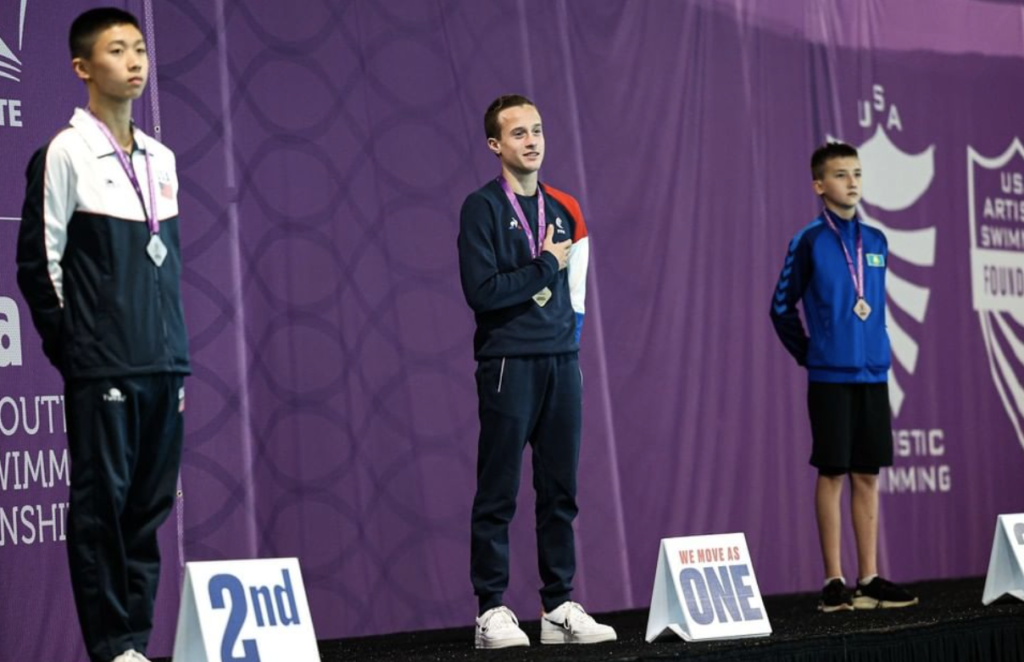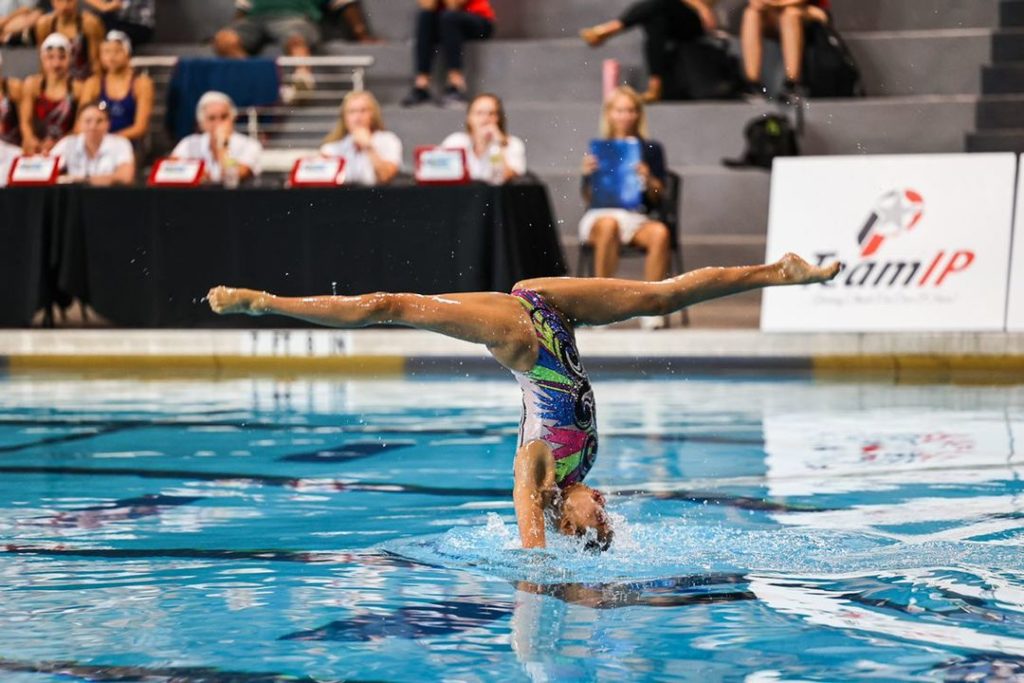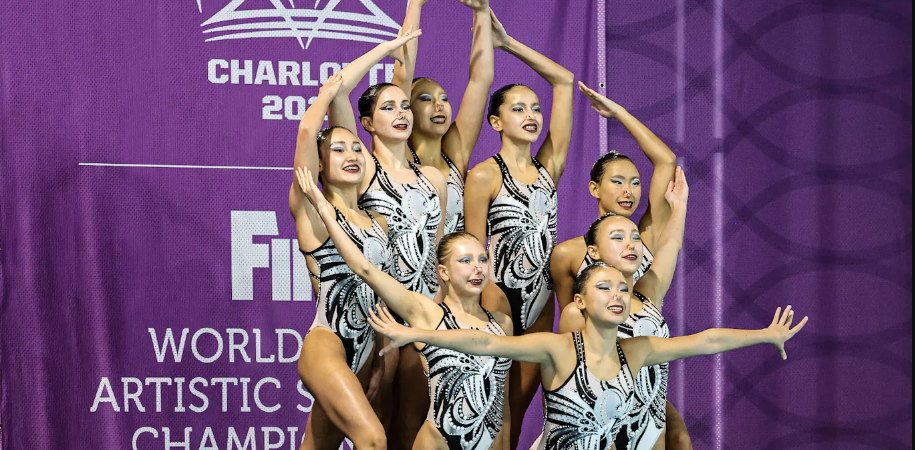The second edition of the FINA Youth World Championships was held a few weeks ago in Charlotte in the United States of America. After a long three-year break because of the pandemic, it was refreshing to see new faces representing 19 different nations. Though with noticeably fewer participants than in 2019, this meet served as a good opportunity for the artistic swimming up-and-coming talents to finally compete internationally.
Sadly, many European countries did not attend this meet and ended their seasons after the European Youth Championships held only 10 days prior. Indeed, most face budget and travel constraints, and an extremely busy competition schedule across all age groups, with coaches often forced to multi-task across them all.
Others such as China or Chile, present in the inaugural edition, did not participate this year either. Finally and understandably so, Belarus, Russia and Ukraine were missing as well due to the ongoing conflict.
With the addition of the men’s solo event, a first in any FINA World Championship, six gold medals were up for grabs. In this 13-15 category, figures play a significant part in determining the medalists. This year, they certainly brought exciting changes to the rankings between the preliminaries and finals in some events.
In the end, Japan and Spain clinched two gold medals each, while France and the USA both earned one.

France, fresh off dominating the European Youth Championships with six medals and four titles, was only represented by its two soloists here. The nation’s gold medal came from reigning European Youth Champion Lucas Valliccioni.
With his “Arsene Lupin” routine receiving a 73.4667 and a three-point lead in the figures, Valliccioni was truly out of reach for the gold. With a total score of 148.8850, he became the first-ever World Champion in the men solo event across all age groups.
Michael Chan from the U.S took the silver, and Kazakhstan’s Aldiyar Ramazanov the bronze. Chan leapt right onto the stage showing off a single-handed cartwheel. Performing to “Eye of the Tiger” by Survivor, he wowed the crowd with a flying fish 360°, even reaching the chest level at the fishtail position. With a 71.3000, his routine was enough to place him nearly four points ahead of Ramazanov, and just two points below Valliccioni.
Including the body-wave boost and the famous Michael Jackson pose in his routine, Ramazanov made a smooth entrance by moonwalking onto the deck before diving in to swim to “Billy Jean”. He scored 70.3333 for a total of 137.0333.
Overall, five young men competed in this inaugural event on the world stage. Mexico‘s Abner Isaac Monter Da Silva and Slovakia‘s Ivan Solymosy completed the field, respectively placing fourth and fifth. Solymosy is actually the younger brother of Silvia Solymosyova and Jozef Solymosy, who won two bronze medals for Slovakia at the senior European Championships on the same weekend.
The women’s solo event had a total of 17 competitors. Only a few weeks after the 2022 World Championships, Japan’s Higa Moe followed in teammate Inui Yukiko’s footsteps and won the gold in Charlotte. Higa, who turns 15 in September, also competed for the nation in Budapest in the technical duet, team, and free combination events.
Her strength and flexibility were highlighted from the very beginning of her routine as she immediately grabbed the judges’ attention with her rocket split. With a unique choice of music and a theme of “A Strange Story,” her performance was intriguing from beginning till end. She earned a routine score of 82.6000. By also placing first in the figures, she did comfortably secured herself the title with a total of 161.8745, two points ahead of France‘s Laelys Alavez.
With a third-place finish in figures, Alavez, the 2022 European Youth champion, ultimately settled for silver here. With a routine packed with difficulty, she scored 81.2000 for a total 159.8308. The French has also had a busy season, competing at both the European and World Junior Championships.
With a strong showing in figures and a fourth-place finish there, Canada’s Olena Verbinska’s narrowed the gap with Spain‘s Carla Lorenzo in the solo preliminaries. However, Lorenzo, the 2022 European Youth bronze medalist, scored just enough in the final with her routine to win bronze by only 0.2495 points.
The Canadian had a nearly two-points lead in the figures, but Lorenzo ultimately received 79.6667 for her routine against the Verbinska’s 77.6000. It was slightly enough to make up for the difference and to give Spain another medal at these championships.
In the duet, Verbinska paired up with Abby Wang and swam to the popular theme of “Robots.” Though the Canadians have only trained the routine for six weeks, they managed to place fourth with a score of 77.3000. However and thanks to their fantastic figures results, the second-best amongst all duets, they moved ahead of the Americans and won bronze with a total of 153.4030.
Overall, figures really did shake up the duet rankings at this competition, and ultimately made the difference to determine the medalists and the final placements.
Swimming immediately after Canada in the final, the Japanese duet of Matsumoto Rena and Mitsuhashi Risako hyped up the crowd with a high-energy routine. Starting with a double lift and going into a 15-second-long hybrid shortly after, their rather difficult routine – which included a Barracuda 360° at the halfway point – passed the 80-point mark (80.6333) to earn them the highest score of the field.
However, their low figures total (74.1700, the fifth of all duet) didn’t allow them to hang on to the title. They still finished with a silver medal, another hugely promising result for this younger generation of Japanese artistic swimmers.
Spain’s pair of Rocio Calle and Xenia de la Puente indeed had a much stronger figures score, which gave them a lead of more than four points heading into the final. Although scoring one point lower than the Japanese in the routines, the reigning European Youth silver medalists secured gold here with a total of 158.2281.

In the mixed duet, Michael Chan and Jennifer Ryu earned the gold for the U.S. with a combined score of 146.4265.
The Americans swam to Korean Pop music ‘I AM THE BEST’ by K-pop group 2NE1, the same song used by the senior mixed duet at the 2019 FINA World Championships. They showed a wonderful lift right at the beginning of the routine, and had many intricate and fast movements throughout the performance. It was more than enough to place them comfortably in first place with a combined total score that was almost 10 points ahead of Great Britain.
Maxwell Sewell and Eve Young, who had placed fifth at the European Youth Championships, won silver here with 136.5473. The British duet performed to “Beggin” by the Italian band Maneskin. The medal wasn’t necessarily a given for Sewell and Young, who had to make up for a fairly disappointing figures total, the fourth of all fifth mixed pairs in the event. Thankfully, their routine score of 69.8333 was just enough to keep Kazakhstan at bay.
Indeed, bronze went to Kazakhstan‘s Yasmina Islamova and Aldiyar Ramazanov who scored 136.1726, only 0.3747 points away from the silver. The expectations may have been high for this young mixed duet, as the nation was the reigning World Youth Champion in his event.
The two had already competed internationally this season, winning silver at the Israel Nationals in June, and handled the pressure beautifully in Charlotte. They performed to a rather dramatic music, which provided a nice change in atmosphere in the competition.
A total of six mixed duets participated in these World Youth Championships, with Mexico, Slovakia and the Cayman Islands completing the field. The latter was represented in this event for the very first time in an international event.
In the team and free combination events, Japan and Spain took turns at the top of the podium. It really was a neck-and-neck battle between the countries in the team final as they tied, both teams scoring 82.0000. However with stronger figures — 76.2704 to Japan’s 74.4444 —, the Spaniards brought home the gold in the end with a total combined score of 158.2704 for their “Avatar” routine.
The Japanese performed to the theme of “Nightmare” for a total of 156.4444. Finally, the home team won bronze with a total of 151.2736 with a “Birds” routine.
Egypt successfully swam in the team preliminary, receiving a score of 144.1965 and sitting in sixth heading into the final. Unfortunately, one of the athletes experienced health problems during the routine and could not complete it. The performance was stopped after the first lap, and the team swam again later on with only seven members. However, the nation does not appear in the final standings.
While Japan couldn’t keep Spain at bay in the team event, it comfortably finished ahead in the free combination with a score of 82.4000. The free combination routines included themes like a Queen tribute swam by Mexico, “Marionettes” swam by the USA, and “Pirates of the Caribbean” by Japan.
All replays of the 2022 World Youth Championships are available on FINA’s YouTube channel.
ARTICLE BY RACHEL THEAN
Cover photo courtesy of USA Artistic Swimming.
If you’ve enjoyed our coverage, please consider donating to Inside Synchro! Any amount helps us run the site and travel costs to cover meets during the season.

